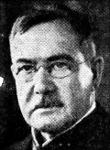'There is no sweeter girl in the whole village of Loos than Emilienne, the heroine of the above story to be featured at the School of Arts on Thursday night. Devoted to her aged father, Pierre, a veteran of the Franco-Prussian war, and to her younger brother, Georges, she has no other thought beyond the care of the children who are under her charge in her capacity as schoolmistress of the village. Dreams of Joan of Arc, her patron Saint, might perhaps dominate her whole life work, still, as she appears in the story before the village is being invaded by the Huns, she is just a normal, lovable girl. She is brought face to face with the grim realities of war, when she bids farewell to Jean do Lovrien, son of her father's old colonel and the sweetheart of her school days. Jean has received his commission and joins his regiment, leaving immediately for the front. The day arrives when peaceful Loos falls under the heels of the invaders. The ruthless Huns sack the village and bring misery into the happy homes. Emilienne and her gallant old father refuse to fly with the more timid of the villagers, and remain in their little home where they have lived so happily. Then incident after incident follows with lightning-like rapidity. How Jean escapes the enemy with his precious despatch, how he is captured by the enemy and eventually released by Emilienne, who, singing "The Marsellaise," and waving the tricolor above her head, rallied the wavering troops of the Allied forces, and led them on to victory, is graphically described, with a startling realism such as is rarely seen in cinema productions of the present day.'
Source:
'The Joan of Arc of Loos', The Muswelbrook Chronicle, 31 May 1916, p.2.

